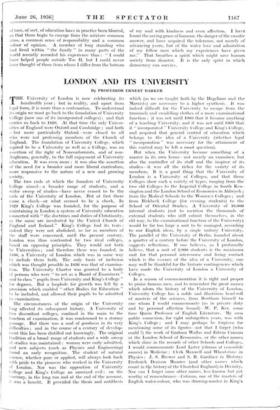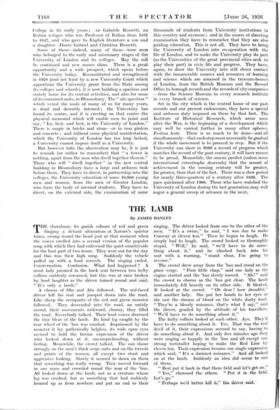LONDON AND ITS UNIVERSITY
By PROFESSOR ERNEST BARKER
THE University of London is now celebrating its .hundredth year ; but in reality, and apart from legal form, it is more than a centenarian. To understand its origin we must go back to the foundation of University College (now one of its incorporated colleges) ; and that carries us back to 1826. At that time the only Univer- sities of England were Oxford and Cambridge ; and both —but more particularly Oxford—were closed to all who were not professing members of the Church of England. The foundation of University College, which aspired to be a University as well as a College, was an assertion of the right of Nonconformists, and of non- Anglicans, generally, to the full enjoyment of University education. It was even more : it was also the assertion of the need for a broader and more liberal curriculum, more responsive . to the nature of a new and growing society.
The two ends at which the founders of University College aimed—a broader range of students, and a wider sweep of studies—have never ceased to be the ends of the University of London. But at first there came a check—or what seemed to be a check. In 1829 King's College was founded, for the purpose of maintaining in London a system of University education connected with " the doctrines and duties of Christianity, as the same arc inculcated by the United Church of England and Ireland." King's College had its tests : indeed they were not abolished, so far as members of the staff were concerned, until the present century. London was thus confronted by two rival colleges, based on opposing principles. They would not both he Universities ; and therefore there was founded, in 1836, a University of London which was in some way to include them both. The only basis of inclusion which was thought possible in 1836 was that of examina- tion. The University Charter was granted to a body of persons who were " to act as a Board of Examiners " and to class " pupils from University and King's College " for degrees. But a loophole for growth was left by a provision which enabled " other Bodies for Education " to be included, and allowed their pupils to be admitted to examination.
The circumstances of the origin of the University long affected its subsequent history. A University of two discordant colleges, confined in the main to the function of examination, it was condemned to a stormy passage. But there was a soul of goodness in its very difficulties ; and in the course of a century of develop- ment this has been distilled out knowingly. The original tradition of a broad range of students and a wide sweep of studies was maintained : women were early admitted, and new subjects (such as Physics and Engineering) found an early recognition. The student of natural science, whether pure or applied, will always look back with pride to the pioneers who worked in the University of London. Nor was the opposition of University College and King's College an unmixed evil : on the contrary, in the long run and at the end of the account, it was a benefit. It provided the thesis and antithesis which (as we are taught both by the Hegelian and the Marxists) are necessary to a higher synthesis. It was indeed diflicult for the University to escape from the trammels and swaddling clothes of a mere examinational function : it was not until 1900 that it became anything of a teaching University, and it was not until 1908 that it " incorporated " University College and King's College, and acquired that general control of education which belongs to the idea of a University (whether legal " incorporation " was necessary for the attainment. of this control may be left a moot question).
But when the University became something of a master in its own house—not merely an examiner, but also the controller of its staff and the inspirer of its studies—it was all the richer for the variety of its members. It is a good thing that the University of London is a University of Colleges, and that those Colleges show such a variety of types, ranging from the two old Colleges to the Imperial College in South Ken- sington and the London School of Economics in Aldwych ; from the Medical Schools to the Women's Colleges ; and from Birkbeck College (for evening students) to the School of Oriental Studies. A University of 10,000 internal students (not to mention the thousands of external students who still submit themselves, in the old way, to the examinational function of the University) would be far too large a unit to be managed, according to our English ideas, by a single unitary University. The parallel of the University of Berlin, founded about a quarter of a century before the University of London, suggests reflections. If one believes, as I profoundly believe, that a unit of 2,000 students is the maximum unit for that personal intercourse and living contact which is the essence of the idea of a I iiiversitv, one may well be thankful for the historic contingencies which have made the University of London a University of Colleges.
In a season of commemoration it is right and proper to praise famous men, and to remember the great names which adorn the history of the University of London. University College has a noble and illustrious bead-roll of masters of the sciences, from Bentham himself to one whom I would commemorate (as in private duty and by personal affection bound)—W. P. Ker, some time Quain Professor of English Literature. My own public connexion, for eight unforgotten years, was with King's College ; and I may perhaps be forgiven for mentioning some of its figures—not that I forget (who could ?) the work of Graham Wallas and Edwin Cannan at the London School of Economics, or the other names which shine in the records of other Schools and Colleges. I would commemorate Lord Listcr (datum et renerabile nomen) in Medicine : Clerk Maxwell and Wheatstone in Physics : J. S. Brewer and S. R. Gardiner in History: Frederick Denison Maurice (and other names which count in the history of the Church of England) in Divinity. Nor can I forget some other names, less known but yet worthy of remembrance—Cotman, one of the masters of English water-colour, who was drawing-master in King's College in its early years ; or Gabriele Rossetti, an Italian refugee who was Professor of Italian from 1831 to 1847, and who gave to English literature a son and a daughter—Dante Gabriel and Christina Rossetti.
Some of these—indeed, many of them—were men who belonged to the early and missionary stages of the University of London and its colleges. May the roll be continued and new names shine. There is a great opportunity and a wide prospect, which opens before the University today. Reconstituted and strengthened in 1928 (and not least by a new University Court which apportions the University grant from the State among its colleges and schools), it is now building a spacious and stately home for its central activities, and also for some of its contained units, in Bloomsbury. The" site question" which vexed the souls of many of us for many years, is dead and decently interred ; the University has found its centre, and it is erecting on that centre the physical memorial which will enable men to point and say, " Lo, best, and best, is the University of London." There is magic in bricks and stone—or in iron girders and concrete ; and without some physical manifestation, which the University of London has too long lacked, a University cannot impose itself as a University.
But however trite the observation may be, it is just to remark (or rather to remember) that " a tower is nothing, apart from the men who dwell together therein." Those who will " dwell together " in the new central building in Bloomsbury have a large and arduous task before them. They have to direct, in partnership into the colleges, the University education of some 10,000 young men and women, from the area of Greater London, who form the body of internal students. They have to direct, on the external side, the examination of some thousands of students from University institutions in this country and overseas ; and in the course of directing examination they have to remember that they are also guiding education. This is not all. They have to bring the University of London into co-operation with the life of London, and to make the University play its part (as the Universities of the great provincial cities seek to play their part) in civic life and progress. They have, again, to draw the University into still closer contact with the innumerable sources and resources of learning and science which are amassed in the treasure-houses of London, from the British Museum and the Record Office to borough records and the records of city companies —from the Science Museum to every research institute in every branch of science.
Set in the city which is the central home of our past records and our present endeavours, they have a special and arduous duty imposed on them by that fact. The Institute of Historical Research, which arose soon after the War, is the beginning of a development which may well be carried further in many other spheres. Festina lente. There is so much to be done—and all simultaneously—that each step must necessarily be gradual if the whole movement is to proceed in step. But if the University can show in 2036 a record of progress which matches the record of the past century, it will have reason to be proud. Meanwhile, the omens predict (unless some international catastrophe descends) that the record of achievement in the coming century will be greater, far greater, than that of the last. There was a slow period for nearly three-quarters of a century after 1836. The pace quickened after 1900. Those who have watched the University of London during the last generation may well augur a general sweep of advance in the next.











































 Previous page
Previous page